1st Act: In the “Polka” bar
The workers in the gold-mining camp are celebrating the end of their shift together in the “Polka” bar. The drinks are flowing, smoke fills the air, and the cards are on the tables. Jake Wallace, the minstrel, starts to sing a song of nostalgia. Touched by memories of family and home, one by one the miners join in. One of them, Larkens, struggles badly with homesickness and begs his colleagues for help, whereby another, Sonora, collects money for the desperate man.
Sid’s cheating at poker has been discovered. Just as the others want to lynch him, the sheriff, Jack Rance, intervenes in the chaos and forbids Sid from playing in further poker games. Sid is then thrown out of the bar.
Ashby, the “Wells Fargo” agent responsible for the secure transport of the gold, enters the bar and tells of his futile search for the bandit Ramerrez and his gang. In the meantime, Rance and Sonora begin to argue fiercely about which of them shall have the right to
the hand of Minnie, the landlady of the “Polka” bar. Minnie herself ends the fight. The men make the adored landlady various gifts.
With full attention, all the men participate in the religious lesson hosted by Minnie, in which she explains, with the aid of Psalm 51, that the love of God may allow forgiveness to every sinner. The Pony Express rider arrives with mail into which the miners immerse themselves. Ashby proudly proclaims to Rance that he has received information on the whereabouts of Ramerrez’ from his alleged lover Nina Micheltorena, and wishes to capture the bandit later that day. The sheriff appears sceptical and warns against trusting the informant.
Rance pressures Minnie to wed him, but she rejects his advances. A man named Johnson enters the saloon, and Rance lets go of her. Minnie and Johnson recognise each other; they once met fleetingly, and begin to wallow in the memories. The miners incited by Rance against the stranger allow themselves to be placated by Minnie and even encourage her to waltz with Johnson.
The jovial atmosphere changes as the captured bandit Castro from Ramerrez’ gang is dragged into the saloon and interrogated. Sent on a false trail by the captive, the majority of the men head off to apprehend Ramerrez. Castro, who recognises Johnson as his leader Ramerrez, secretly lets him in on his plan: he allowed himself to be captured, and a whistle from Johnson should be enough to summon the rest of the gang.
Apart from the bartender Nick, only Minnie and Johnson stay behind and they get closer to each other. Johnson learns from Minnie that she has never kissed a man. After showing him the saloon, she invites him home to the place where the gold is stored.
2nd Act: Minnie’s dwelling
Minnie’s housekeeper Wowkle and her partner Billy Jackrabbit, both destitute and concerned for the future of their child, are planning their wedding. The lady of the house shoos Billy from her abode and orders Wowkle to pre-
pare food for her dinner with Johnson and clean the apartment.
After Johnson’s arrival, Minnie sends Wowkle home and confesses her love for him. They kiss. He then wishes to leave, but a heavy snowfall has made the road unpassable. Johnson becomes nervous as he hears pistol shots outside, and stays with Minnie. Both swear their love for each other, and she learns his first name: Dick.
Upon hearing shouts from outside, Minnie urges Johnson to hide, as she fears Rance’s jealousy. Rance arrives together with Nick, Ashby and Sonora to warn Minnie that the bandit Ramerrez has been seen near her apartment. They also inform her that Johnson is actually Ramerrez, a fact she refuses to believe. Nick notices Johnson’s cigar butt on the floor, but conceals this information from the others. Minnie learns from Rance that the news of Johnson’s true identity has come from Nina Micheltorena, and that she was carrying a photograph of the bandit.
Once the men have left Minnie’s apartment, she approaches Johnson and accuses him of only coming to the Polka to steal gold. He then reveals himself to be Ramerrez and attempts to justify his actions: after the death of his father, he took charge of the gang and accepted this new-found power as his fate. Realising that Johnson had stolen her first kiss under false pretences, she sends him packing.
Johnson is shot and hauls himself back to Minnie’s home, where she hides him in the attic. Rance has followed Johnson’s trail to her apartment, but is unable to find him at first. He pressures Minnie for information and assures her again of his love. Upon discovering traces of blood, Rance then finds Johnson in hiding.
In desperation, Minnie suggests a game of poker to Rance. Victory should decide whether Minnie give herself to the sheriff and Johnson die, or whether Rance leave the lovers in peace. She cheats, and wins. Rance keeps his promise and leaves her apartment without a word.
3rd Act: The hunt
In the meantime, the miners, together with Billy Jackrabbit, Nick, Ashby and Rance have been looking for days for Johnson. Rance bemoans his decision not to apprehend Johnson when he had the chance.
Johnson is eventually captured after a wild chase, and presented by Ashby to Rance, who has been chosen to execute the hanging. Rance savours his triumph while the others demand Johnson’s quick execution. Nick bribes Billy, who is preparing the gallows, to delay the hanging so he can alert Minnie.
The enraged men accuse Johnson of further murders, which he naturally disputes; he is a thief, not a killer. Furthermore, he begs them to refrain from telling Minnie about his brutal execution, and that she may believe that he escaped with his life.
Armed with a pistol, Minnie interrupts the execution and stands protectively in front of Johnson, whose neck is already in the noose from which the men wish to see him dangle. Threatening her own suicide, Minnie is then able to stave off the wild pack. She reminds the men of her religious class on forgiveness. One after the other, the men decide to save Johnson. Minnie then bids farewell to the miners, and leaves the state together with Johnson.
Time:1849 to 1850.
Place: A mining camp at the foot of the Cloudy Mountains, California.
Act 1
Inside the Polka Saloon
A group of Gold Rush miners enter the "Polka" saloon after a day working at the mine ("Hello! Hello! Alla 'Polka'"). After a song by traveling minstrel Jake Wallace ("Che faranno i vecchi miei"), one of the miners, Jim Larkens, is homesick and the miners collect enough money for his fare home ("Jim, perchè piangi?").
A group of miners playing cards discover that Sid is cheating and want to attack him. Sheriff Jack Rance quiets the fight and pins two cards to Sid's jacket, as a sign of a cheat.
A Wells Fargo agent, Ashby, enters and announces that he is chasing the bandit Ramerrez and his gang of Mexicans. Rance toasts Minnie, the woman who owns the saloon, as his future wife, which makes Sonora jealous. The two men begin to fight. Rance draws his revolver but at that moment, a shot rings out and Minnie stands next to the bar with a rifle in her hands ("Hello, Minnie!"). She gives the miners a reading lesson from the Bible ("Dove eravamo?").
The Pony Express rider arrives ("La posta!") and delivers a telegram from Nina Micheltorena, offering to reveal Ramerrez's hideout. The sheriff tells Minnie that he loves her, but Minnie puts him off as she is waiting for the right man ("Ti voglio bene, Minnie").
A stranger enters the saloon and asks for a whisky and water. He introduces himself as Dick Johnson from Sacramento, whom Minnie had met earlier. Johnson invites Minnie to dance with him and she accepts. Angrily, Rance watches them.
Ashby returns with the captured Ramerrez gang member, Castro. Upon seeing his leader, Johnson, in the saloon, Castro agrees to lead Rance, Ashby and the miners in a search for Ramerrez, and the group then follows him on a false trail and in what turns out to be a wild goose chase. But before Castro leaves, he whispers to Johnson that somebody will whistle and Johnson must reply to confirm that the place is clear. A whistle is heard, but Johnson fails to reply.
Minnie shows Johnson the keg of gold that she and the miners take turns to guard at night and Johnson reassures her that the gold will be safe there. Before he leaves the saloon, he promises to visit her at her cabin. They confess their love for each other. Minnie begins to cry, and Johnson comforts her before he leaves.
Act 2
Minnie's dwelling, later that evening
Wowkle, a Native American woman who is Minnie's servant, her lover Billy Jackrabbit and their baby are present as Minnie enters, wanting to get ready for Johnson's visit. Johnson enters Minnie's cabin and she tells him all about her life. It begins to snow. They kiss and Minnie asks him to stay till morning. He denies knowing Nina Micheltorena. As Johnson hides, a posse enters looking for Ramerrez and reveal to Minnie that Johnson is the bandit Ramerrez himself. Angry, she orders Johnson to leave. After he leaves, Minnie hears a gunshot and she knows Johnson has been shot. Johnson staggers in and collapses, Minnie helps him by hiding him up in the loft. Rance enters Minnie's cabin looking for the bandit and is about to give up searching for Johnson when drops of blood fall on his hand. Rance forces Johnson to climb down. Minnie desperately makes Rance an offer: if she beats him at poker, he must let Johnson go free; if Rance wins, she will marry him. Hiding some cards in her stockings, Minnie cheats and wins. Rance honors the deal and Minnie throws herself on the unconscious Johnson on the floor.
Act 3
In the Great Californian Forest at dawn, sometime later
Johnson is again on the run from Ashby and the miners. Nick and Rance are discussing Johnson and wonder what Minnie sees in him when Ashby arrives in triumph: Johnson has been captured. Rance and the miners all want Johnson to be hanged. Johnson accepts the sentence and only asks the miners not to tell Minnie about his capture and his fate ("Ch'ella mi creda"). Minnie arrives, armed with a pistol, just before the execution and throws herself in front of Johnson to protect him. While Rance tries to proceed, she convinces the miners that they owe her too much to kill the man she loves, and asks them to forgive him ("Ah! Ah! E Minnie!"). One by one, the miners yield to her plea ("E anche tu lo vorrai, Joe"). Rance is not happy but finally he too gives in. Sonora unties Johnson and sets him free. The miners bid Minnie farewell ("Le tue parole sono di Dio"). Minnie and Johnson leave California to start a new life together.


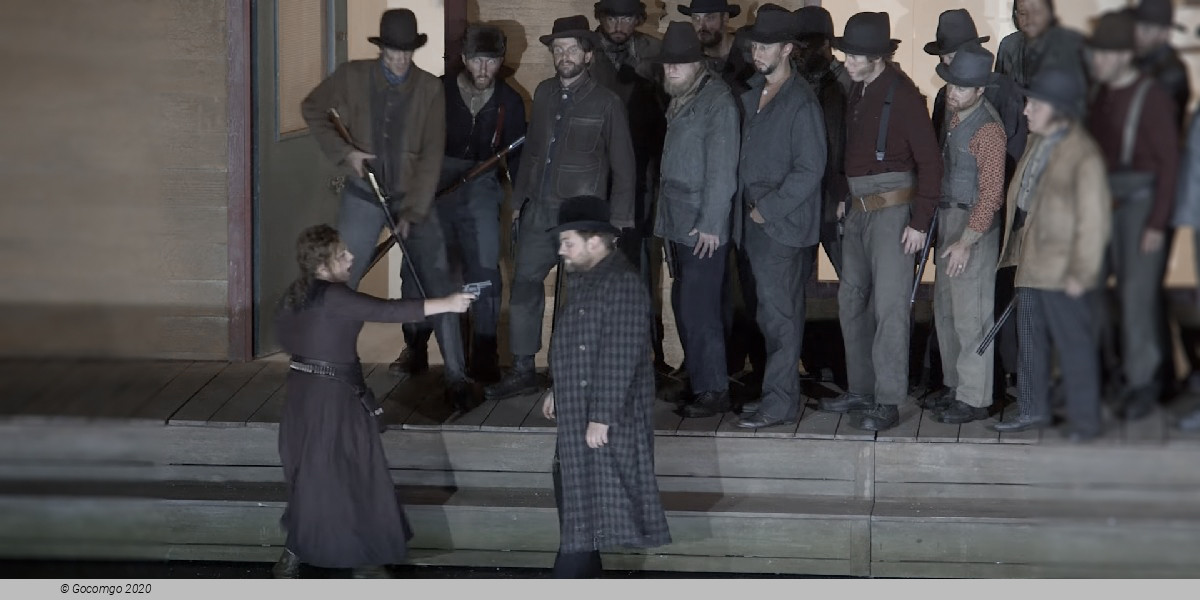
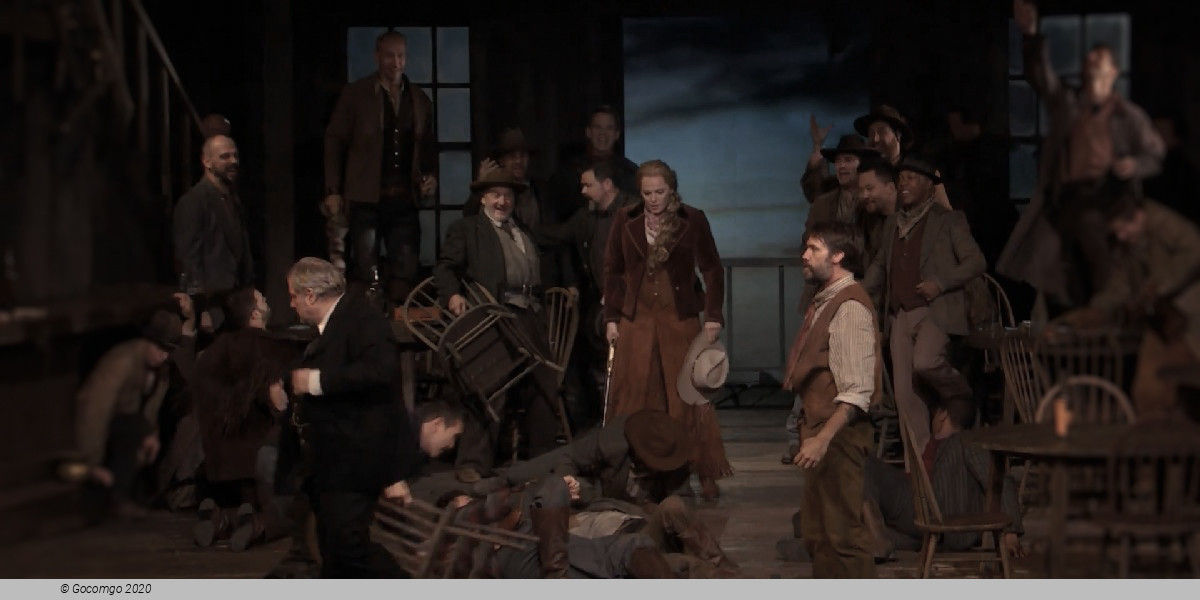
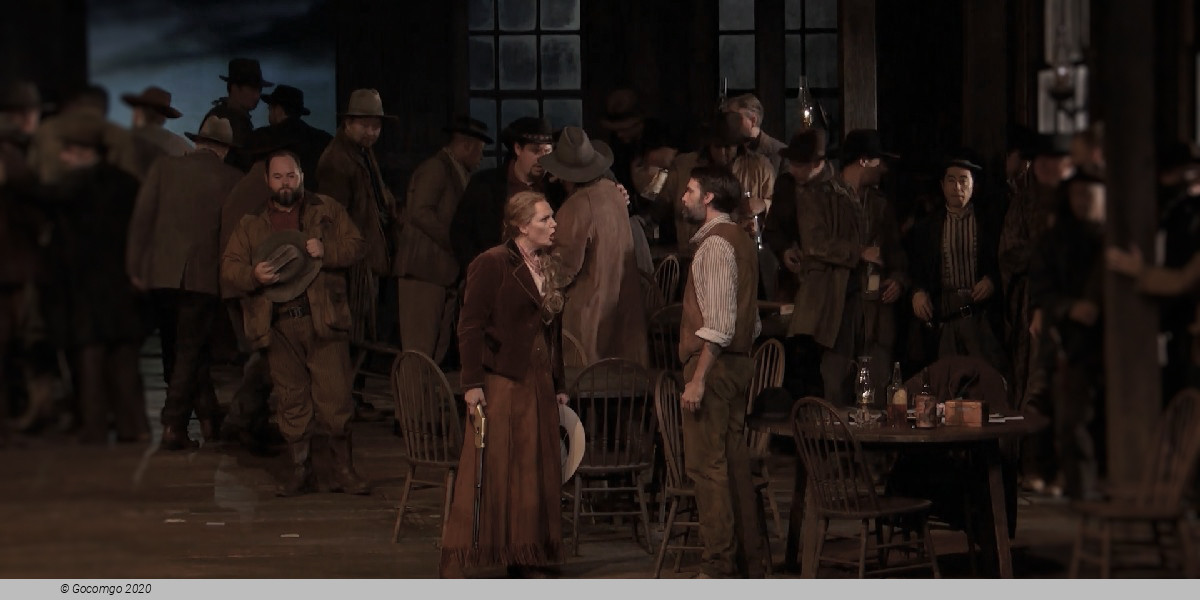
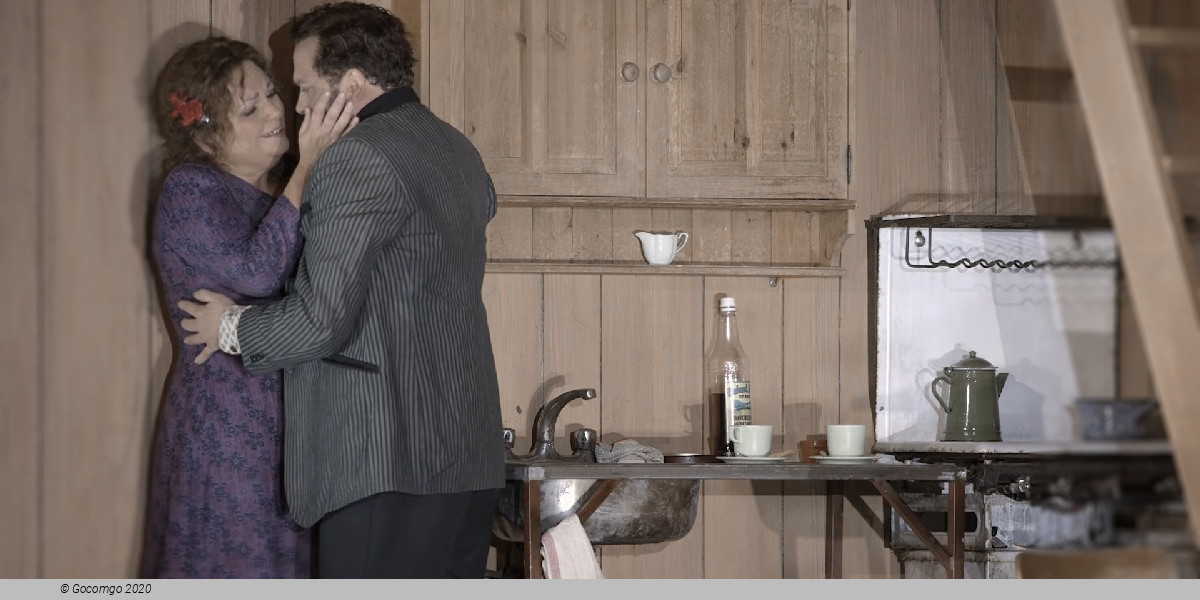
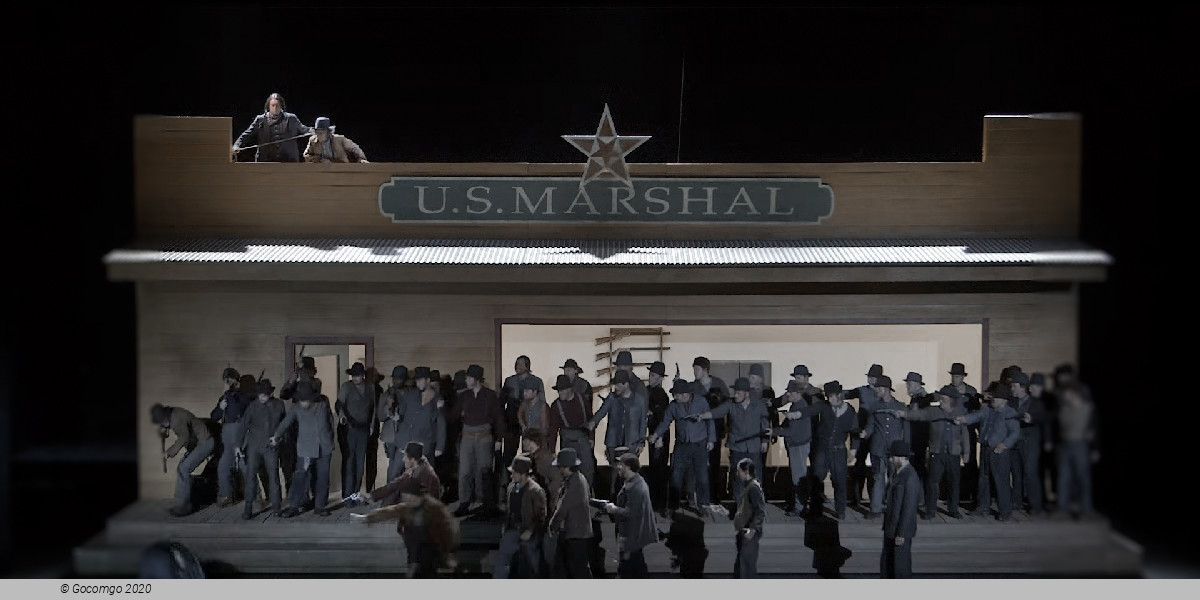
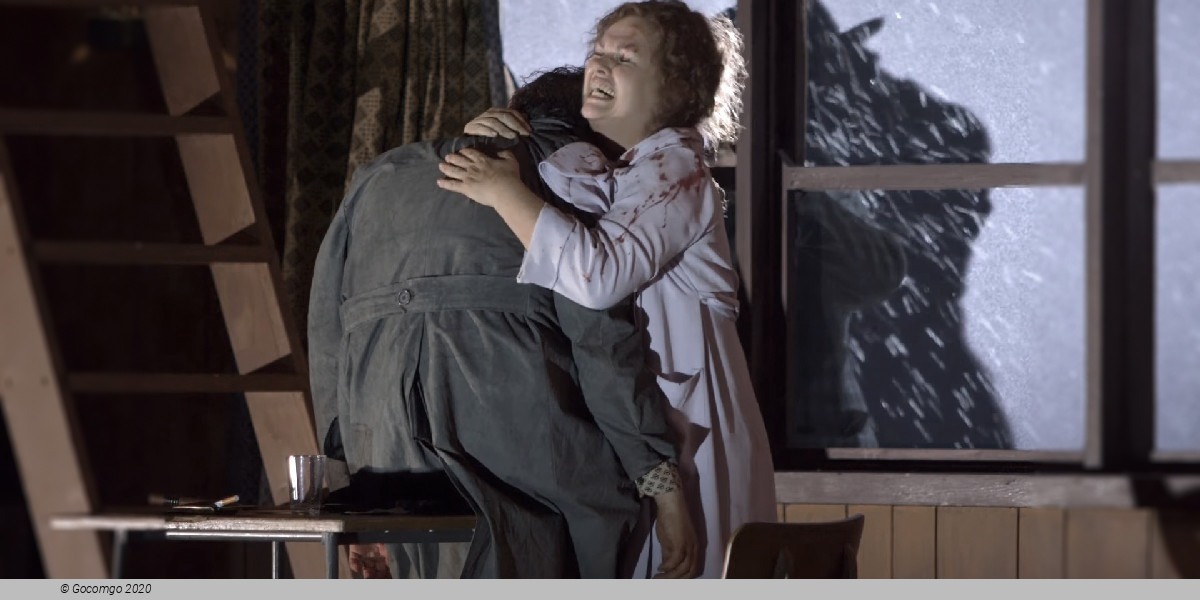
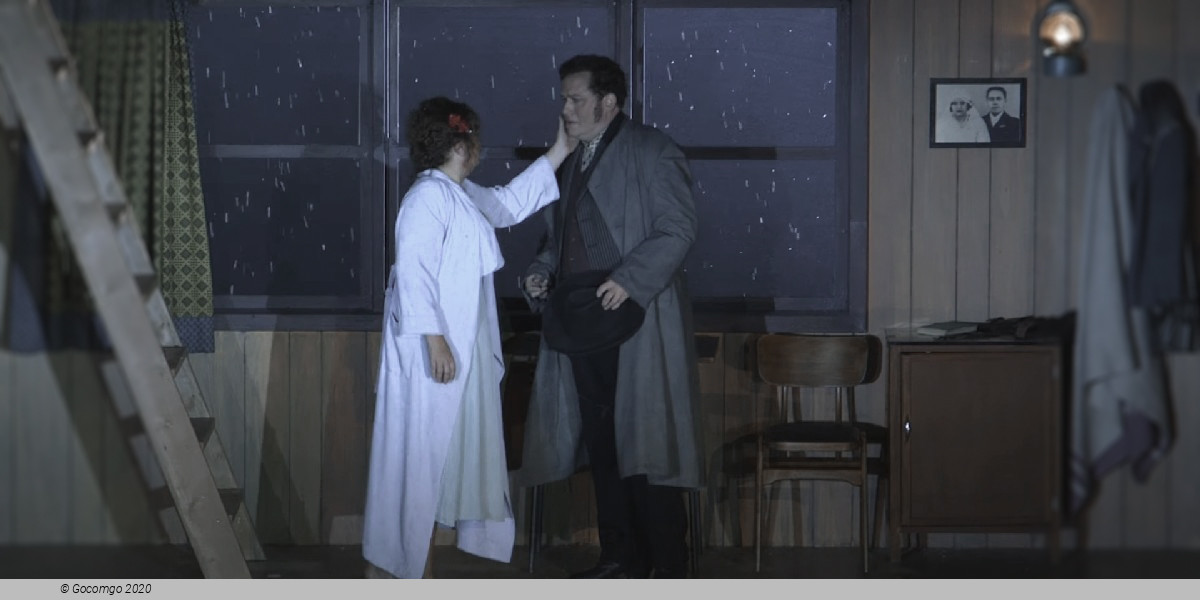
 Max-Joseph-Platz 2
Max-Joseph-Platz 2